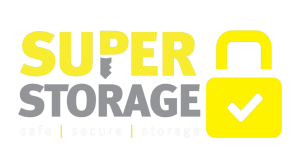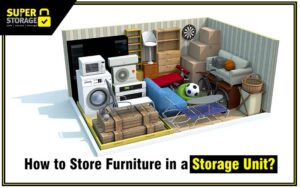Many people across the UK are running out of space in their homes. Self-storage has become a popular and easy solution to store extra things without needing to move house or throw them away. It’s useful for various situations, such as moving, downsizing, or simply creating more space at home.
Today, more than 2 million families in the UK use self-storage to keep their belongings safe. With house prices staying high and homes getting smaller, self-storage is now seen as a smart and affordable choice, whether you’re looking for a Small Storage Unit to store a few boxes or a Large Storage Unit to handle an entire household’s worth of items.
According to the updated UK annual industry report, Average Self-Storage Cost is based on around £29.13 per square foot per year, which is a 6% increase from 2023. The average occupancy rate is 83.3%, showing that demand is strong across the country. Prices can change depending on the unit size and location.
If you’re comparing self storage cost per month in 2025, this guide gives you a clear look at pricing across the UK, plus tips to help you choose the right unit and avoid overpaying. It’s important to understand the costs and storage options before booking a unit, so you can choose the right one and get the best value for your money.
How Much Does Self-Storage Cost Monthly in the UK?
The expected monthly cost of self-storage in the UK typically ranges from £25 for the smallest units to around £150 for the largest standard units. The price depends on things like the size of the unit, where it’s located, and what services are included. The prices may look very different at first. But once you understand what affects the cost, it’s easier to plan your budget.
Here is a short detail about the Storage Unit Size Guide to help you understand the different unit sizes and what they can typically hold.
| Unit Size | Monthly Cost (Avg) | Ideal For |
| 10 sq ft | £25–£40 | Boxes, seasonal items |
| 25 sq ft | £45–£70 | Studio flat contents |
| 50 sq ft | £75–£110 | 1-bedroom flat |
| 100 sq ft | £120–£150+ | Home removals or business |
| 250 sq ft | £175–£250 | 1-2 bedroom house |
| 500 sq ft | £250 +£350 | 3-4 bedroom house or significant business inventory |
| 900+ sq ft | £450–£600 | 5+ bedroom house, small warehouse needs, or extensive business operations. |
Understanding these factors will help you find the best value for your specific situation.
Factors That Influence Monthly Storage Costs
Understanding what affects storage unit prices can help you choose wisely and even save money. There are a few important things that decide how much you’ll pay each month. Knowing these can make it easier to find the best deal for your needs.
1. Location – Big Cities vs Small Towns
Location is one of the main factors that affect the monthly cost of self-storage. London is expensive; you might pay double or even triple what you’d pay in a small town. If you pick a storage place right in the city center, it’ll cost more than one on the edge of town. Storage places near shops and houses usually cost more than ones in business areas.
Prices in Northern England are often much cheaper than in the South. If you’re looking to save money, it might be worth choosing a storage unit a little further from your home, especially if the price difference is big.
2. Unit Size – From Lockers to Garage-Sized
Storage units come in different sizes, so choosing the right one helps you get the best value for your money. Small units between 10 to 25 square feet are perfect for documents, seasonal clothes, or just a few boxes of belongings. Medium units of 50 to 75 square feet work well for studio or one-bedroom flat contents, while large units of 100+ square feet are ideal for whole house moves or business inventory. Understanding these different storage unit sizes ensures you don’t pay for extra space you won’t use.
3. Storage Type – Indoor, Outdoor, or Climate-Controlled
Different types of storage come with different price tags, and each serves different purposes. Outdoor storage is the cheapest option and works great for furniture and items that aren’t sensitive to temperature changes. Indoor storage offers mid-range pricing with better protection from weather and increased security. Climate-controlled storage is the most expensive option but essential if you’re storing electronics, artwork, important documents, or anything that could be damaged by temperature or humidity fluctuations.
4. Contract Duration & Promotions
Many storage rental companies reward longer commitments with better pricing. Monthly contracts offer the most flexibility but are often the most expensive option. Six-month agreements usually come with 10 to 15% savings, while annual contracts offer the best value and sometimes include perks like the first month free.
5. Insurance, 24/7 Access, and Other Add-ons
Extra services can add to your monthly bill, but many are worth considering for peace of mind. Self storage insurance typically costs between £2 to £10 per month and protects your belongings against theft, fire, or damage. 24/7 secure access is often included in modern facilities but might cost extra at some locations. Other potential costs include moving supplies, trolley rentals, and collection and delivery services that can range from £20 to £50 per trip.
Self Storage Cost by UK Region
Regional storage costs vary significantly across the UK, and understanding these differences can help you budget accurately or even consider alternative locations if you have flexibility.
London Self Storage Costs
London remains the most expensive region for storage space, reflecting the high property costs in the capital. A small 10 square foot unit will cost you between £40 to £60 per month, while a 25 square foot space ranges from £70 to £100 monthly. If you need a 50 square foot unit, expect to pay £120 to £180 per month, and larger spaces of 100+ square feet can cost £200 to £300 or more. These prices reflect the premium location and typically excellent security and access features.
Manchester, Birmingham, Leeds & Stoke-on-Trent
When it comes to finding affordable self storage, cities outside London like Manchester, Birmingham, Leeds, and Stoke-on-Trent offer much better value. These areas not only provide excellent storage facilities but are also conveniently located, making them a smart choice for both individuals and businesses.
In these regions, the Average Self-Storage Cost per Month is much more budget-friendly compared to London. For example, a 10 square foot unit—ideal for storing boxes or small household items—usually costs between £25 and £40 per month. A medium-sized 25 square foot unit can range from £45 to £65, while a 50 square foot unit, suitable for storing the contents of a small flat, typically costs between £75 and £110. Larger units of 100 square feet or more may cost anywhere from £120 to £180 per month, depending on the facility and location.
Among these cities, Stoke-on-Trent is often highlighted as one of the most cost-effective options for storage. It’s known for offering lower prices without compromising on quality. A great example is Super Storage, which provides clean, secure, and accessible units with all the essential features like 24/7 access, CCTV, and flexible contracts. It’s a reliable choice that gives you excellent value for money.
Scotland, Wales, and Northern Ireland
These regions typically offer the cheapest self storage options, making them excellent value if you live in these areas. Small 10 square foot units cost just £20 to £35 per month, while 25 square foot spaces range from £35 to £55 monthly. A 50 square foot unit will cost between £60 to £90 per month, and larger spaces of 100+ square feet typically range from £100 to £140 monthly. Despite the lower costs, facilities in these regions often offer the same security and access features as more expensive locations.

How to Save Big on Cheap Self Storage in the UK
If you want to save money on self-storage in the UK, Several proven strategies can significantly reduce your monthly costs without compromising on security or convenience.
- Use Off-Peak Discounts & Longer-Term Deals
Timing can make a big difference to your storage costs. Booking during quieter months like January through March often means better rates as facilities try to fill empty units. Many companies offer “first month free” promotions, especially for new customers, which can represent substantial savings. Consider annual contracts if you know you’ll need storage long-term, as these often come with significant discounts. Don’t forget to ask about student discounts if you’re in education, or business rates if you’re storing commercial items.
- Compare Multiple Providers
Don’t go with the first price you get, as prices can vary dramatically between providers even in the same area. Get quotes from at least three to four different companies and use online comparison sites to quickly identify the best deals. Make sure to do a storage unit size comparison while reviewing options, as unit dimensions and what they can hold may differ between facilities. Reading customer reviews is crucial for understanding the real quality of service, and visiting facilities in person helps you assess security, cleanliness, and convenience. Remember that the cheapest option isn’t always the best value if it means poor security or inconvenient access hours.
- Choose the Right Size (Only pay for the storage space you actually need)
One of the biggest mistakes people make is renting a unit that’s too large for their needs. Use online storage unit size calculators UK, provided by storage companies, to get a rough estimate, but visiting facilities to see units in person gives you a much better sense of space. If you’re unsure about how much room you need, consider starting with a smaller unit and upgrading later if necessary. Many facilities allow you to change unit sizes with reasonable notice. Short-term storage prices can be higher per month, but if you’re genuinely unsure about duration, the flexibility might be worth the extra cost.
Self Storage for Business vs. Personal Use
Business storage supports operations by providing flexible space for stock, tools, documents, or equipment. It’s especially useful for e-commerce sellers, contractors, and offices needing secure, scalable storage without long-term leases.
Personal storage:
Personal storage units are ideal for individuals needing extra space during life transitions, such as moving, renovating, or managing household clutter. They offer a temporary or long-term solution to safely store personal belongings outside the home.
Benefits:
- Used mainly during life changes and for managing space.
- Moving house often creates a need for temporary storage between homes.
- Students need storage during summer breaks between academic terms.
Helpful for decluttering and storing items like:
- Seasonal decorations (e.g. Christmas items)
- Garden furniture and off-season clothing
Needed during major life events like:
- Downsizing
- Home renovations
- Relationship changes
- Storage duration can range from a few months to several years.
Business storage:
Business storage units cater to companies that require secure and scalable space for various operational needs. These units support short-term or ongoing storage of items related to daily business activities, allowing flexibility without the commitment of permanent premises.
Benefits:
- Serves for different purposes from personal storage and often needs extra features.
E-commerce sellers use it to:
- Store inventory
- Buy products in bulk
Office archive storage is used to:
- Keep important documents
- Meet legal record-keeping rules
- Free up valuable office space
Contractors and tradespeople use storage for:
- Storing tools
- Keeping machinery secure
Main benefit: flexibility – businesses can:
- Increase or decrease storage space as needed
- Avoid long-term leases or big property costs
Business storage solutions UK typically come with additional services that personal users rarely need. These include invoice billing options that make accounting easier, bulk storage discounts for larger spaces, collection and delivery services that save time, and flexible access arrangements that accommodate business hours. Many business customers also appreciate the ability to receive deliveries directly to their storage unit, turning it into a flexible warehouse space.
Final Thoughts:
Self storage can provide excellent value if you choose wisely and use it for the right purposes. The service makes perfect sense for temporary storage rental during house moves, giving you flexibility in timing and reducing stress during an already challenging time. Long-term storage solutions work well for items you’ll definitely use again but don’t have space for right now, such as seasonal decorations, sports equipment, or furniture from a deceased relative that has sentimental value.
Business owners often find storage very useful for keeping extra stock, important documents, or tools and equipment they don’t use all the time. One big benefit is that they can easily rent more or less space as their needs change. This makes it much cheaper than renting a bigger shop or office permanently.
Before choosing a provider, it is smart to consider the Average Self-Storage Cost per Month, including insurance and any additional fees, as these can significantly impact the real cost. Think about location convenience versus price savings, especially if you’ll be accessing your unit frequently. Security features and access hours should match your needs and comfort level. Finally, it’s important to check how flexible the contract is and what the exit terms are. This is helpful in case your storage needs change suddenly and you need to stop or adjust your rental.
FAQs
How much does it cost to rent a 50 sq ft storage unit in the UK ?
A 50 sq ft storage unit typically costs between £75 to £110 per month in 2025, though location makes a huge pricing difference. In London, you might pay £120 to £180 for the same space, while northern regions like Scotland or Wales might offer rates as low as £60 to £90. The type of facility also affects pricing, with climate-controlled indoor units costing more than basic outdoor storage.
How big is a 50 sq ft storage unit ?
This size is ideal for storing the contents of a 1-bedroom flat, including furniture like a sofa, bed, dining table, boxes, and small appliances.
Do I need insurance for a storage unit in the UK ?
While not legally required, self storage insurance is highly recommended and relatively inexpensive. Most facilities offer their own insurance policies for £2 to £10 per month, which is often the most convenient option. Alternatively, you might be able to extend your existing home insurance to cover items in storage, though you’ll need to check with your insurer about coverage limits and whether this affects your premium.
Are there any hidden fees in storage rental ?
Unfortunately, some storage companies do add extra costs that aren’t always clearly advertised upfront. Common additional charges include administration fees of £10 to £30 as a one-time cost, mandatory lock purchases costing £10 to £20, and access card deposits of £10 to £20. You might also face late payment charges if you miss payments and exit cleaning fees if you don’t leave your unit in good condition. Always ask for a complete breakdown of all potential costs before signing any contract.
Which cities have the cheapest storage options ?
Northern England, Scotland, Wales, and smaller market towns consistently offer the cheapest self storage rates. Cities like Preston, Hull, Stoke-on-Trent, and Aberdeen often have excellent value options that cost significantly less than major metropolitan areas. However, remember that the cheapest option isn’t always the best value if it means compromising on security, convenience, or access hours that matter to you.
Can I access my self storage unit 24/7 ?
Most modern secure self storage facilities offer 24/7 secure access, recognizing that people need flexibility in when they can visit their belongings. However, some smaller or older facilities may have restricted hours, typically operating from 6am to 10pm. Always check access hours before signing a contract, especially if you work unusual hours or might need weekend access. Some facilities charge extra for out-of-hours access, so clarify this upfront.




